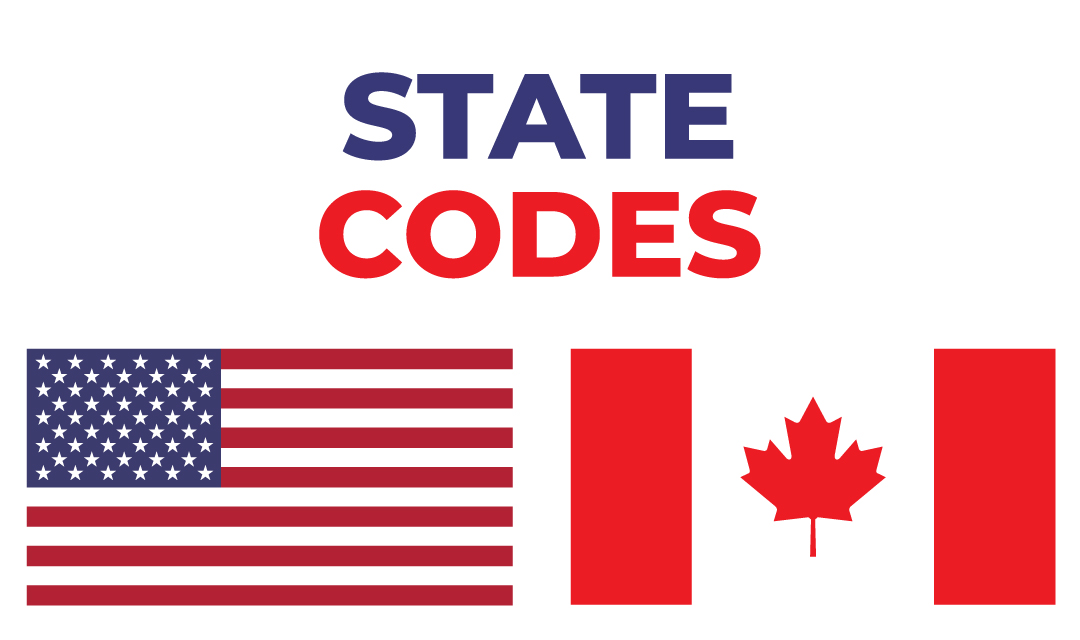
State codes in the United States are two-letter abbreviations used to represent each of the 50 states within the country. They are a practical and standardized way to represent the 50 states, making it easier to handle mail, data, and communications on a national scale. They play a crucial role in ensuring that information and resources are directed accurately and efficiently to their intended destinations, whether it's a letter, a package, statistical data, or a phone call.
USA

| STATE NAME | STATE ABBREVIATION | TIME ZONE (UTC Offset) | STATE CAPITAL |
|---|---|---|---|
| Alabama | AL | UTC -6:00 (CST) | Montgomery |
| Alaska | AK | UTC -9:00 (AKST) | Juneau |
| Arizona | AZ | UTC -7:00 (MST) | Phoenix |
| Arkansas | AR | UTC -6:00 (CST) | Little Rock |
| American Samoa | AS | UTC -11:00 (SST) | Pago Pago |
| California | CA | UTC -8:00 (PST) | Sacramento |
| Colorado | CO | UTC -7:00 (MST) | Denver |
| Connecticut | CT | UTC -5:00 (EST) | Hartford |
| Delaware | DE | UTC -5:00 (EST) | Dover |
| District of Columbia | DC | UTC -5:00 (EST) | Washington, D.C. |
| Florida | FL | UTC -5:00 (EST) | Tallahassee |
| Georgia | GA | UTC -5:00 (EST) | Atlanta |
| Guam | GU | UTC +10:00 (ChST) | Hagåtña |
| Hawaii | HI | UTC -10:00 (HST) | Honolulu |
| Idaho | ID | UTC -7:00 (MST) | Boise |
| Illinois | IL | UTC -6:00 (CST) | Springfield |
| Indiana | IN | UTC -5:00 (EST) | Indianapolis |
| Iowa | IA | UTC -6:00 (CST) | Des Moines |
| Kansas | KS | UTC -6:00 (CST) | Topeka |
| Kentucky | KY | UTC -5:00 (EST) | Frankfort |
| Louisiana | LA | UTC -6:00 (CST) | Baton Rouge |
| Maine | ME | UTC -5:00 (EST) | Augusta |
| Maryland | MD | UTC -5:00 (EST) | Annapolis |
| Massachusetts | MA | UTC -5:00 (EST) | Boston |
| Michigan | MI | UTC -5:00 (EST) | Lansing |
| Minnesota | MN | UTC -6:00 (CST) | Saint Paul |
| Mississippi | MS | UTC -6:00 (CST) | Jackson |
| Missouri | MO | UTC -6:00 (CST) | Jefferson City |
| Montana | MT | UTC -7:00 (MST) | Helena |
| Nebraska | NE | UTC -6:00 (CST) | Lincoln |
| Nevada | NV | UTC -8:00 (PST) | Carson City |
| New Hampshire | NH | UTC -5:00 (EST) | Concord |
| New Jersey | NJ | UTC -5:00 (EST) | Trenton |
| New Mexico | NM | UTC -7:00 (MST) | Santa Fe |
| New York | NY | UTC -5:00 (EST) | Albany |
| North Carolina | NC | UTC -5:00 (EST) | Raleigh |
| North Dakota | ND | UTC -6:00 (CST) | Bismarck |
| Northern Mariana Islands | MP | UTC +10:00 (ChST) | Saipan |
| Ohio | OH | UTC -5:00 (EST) | Columbus |
| Oklahoma | OK | UTC -6:00 (CST) | Oklahoma City |
| Oregon | OR | UTC -8:00 (PST) | Salem |
| Pennsylvania | PA | UTC -5:00 (EST) | Harrisburg |
| Puerto Rico | PR | UTC -4:00 (AST) | San Juan |
| Rhode Island | RI | UTC -5:00 (EST) | Providence |
| South Carolina | SC | UTC -5:00 (EST) | Columbia |
| South Dakota | SD | UTC -6:00 (CST) | Pierre |
| Tennessee | TN | UTC -6:00 (CST) | Nashville |
| Texas | TX | UTC -6:00 (CST) | Austin |
| Utah | UT | UTC -7:00 (MST) | Salt Lake City |
| Vermont | VT | UTC -5:00 (EST) | Montpelier |
| Virginia | VA | UTC -5:00 (EST) | Richmond |
| Washington | WA | UTC -8:00 (PST) | Olympia |
| West Virginia | WV | UTC -5:00 (EST) | Charleston |
| Wisconsin | WI | UTC -6:00 (CST) | Madison |
| Wyoming | WY | UTC -7:00 (MST) | Cheyenne |
CANADA 
Province codes in Canada are two-letter abbreviations used to represent each of the country's provinces and territories. Province codes play a fundamental role in ensuring efficient communication, transportation, data management, and administrative processes within the country. They simplify the handling of mail, data, and communications on a national scale and help prevent errors in addressing, data analysis, and resource allocation.
| PROVINCE NAME | ABBREVIATION | TIME ZONE (UTC OFFSET) | CAPITAL |
|---|---|---|---|
| Alberta | AB | UTC -7:00 (MST) | Edmonton |
| British Columbia | BC | UTC -8:00 (PST) | Victoria |
| New Brunswick | NB | UTC -4:00 (AST) | Fredericton |
| Newfoundland and Labrador | NL | UTC -3:30 (NST) | St. John's |
| Northwest Territories | NT | UTC -7:00 (MST) | Yellowknife |
| Nova Scotia | NS | UTC -4:00 (AST) | Halifax |
| Nunavut | NU | UTC -5:00 (EST) | Iqaluit |
| Ontario | ON | UTC -5:00 (EST) | Toronto |
| Prince Edward Island | PE | UTC -4:00 (AST) | Charlottetown |
| Quebec | QC | UTC -5:00 (EST) | Quebec City |
| Saskatchewan | SK | UTC -6:00 (CST) | Regina |
| Yukon | YT | UTC -7:00 (PST) | Whitehorse |
